In today’s fast-paced digital economy, e-commerce businesses face constant pressure to evolve. With technology advancing rapidly, providing a seamless, efficient, and personalized customer experience has become paramount. One of the most crucial tools that modern e-commerce businesses can leverage to achieve this is custom API development.
An API, or Application Programming Interface, is a bridge that allows two or more software applications to communicate with each other. In the context of e-commerce, APIs are essential for connecting various systems such as payment gateways, inventory management, customer relationship management (CRM) tools, shipping carriers, and much more.
While pre-built APIs are widely available, custom APIs provide greater flexibility and adaptability. Custom API development allows businesses to create tailored solutions designed to fit their specific needs, ensuring they can scale efficiently, optimize processes, and enhance the overall customer experience.
Understanding Custom API Development for E-commerce
To fully appreciate why custom API development is essential for e-commerce, it’s important to first understand what APIs are and how they work. At its core, an API is a set of protocols and tools that enables different software applications to interact with each other.
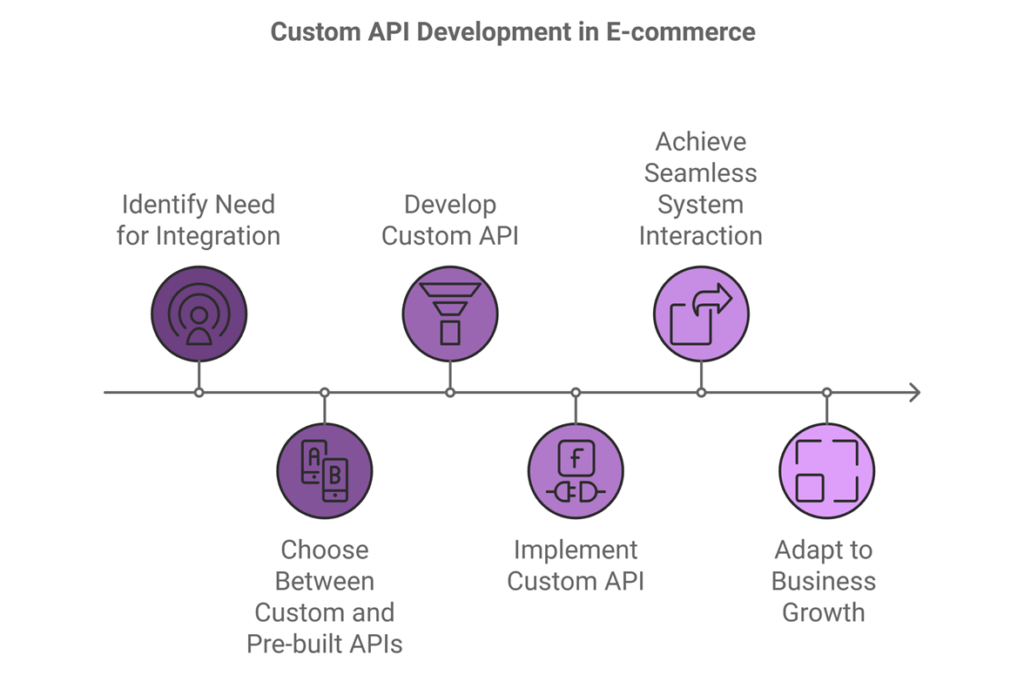
APIs are what allow your e-commerce platform to seamlessly connect with external systems—such as payment gateways, inventory management systems, and third-party applications—without requiring manual input or intervention.
In e-commerce, APIs can be used for a wide range of purposes, from processing payments and managing inventory to integrating shipping and handling logistics. Without APIs, e-commerce businesses would struggle to maintain the necessary integrations between these various systems, leading to inefficiencies, errors, and delays.
One of the primary benefits of custom API development lies in its ability to offer a personalized and tailored approach to system integration. While off-the-shelf or pre-built APIs can offer basic functionality, they often come with limitations that prevent e-commerce businesses from scaling or adapting as needed.
Custom APIs, on the other hand, are designed with the specific needs and goals of the business in mind. They allow businesses to control how data flows between different systems and ensure that their platform can easily integrate with any tools or services they use, whether they are industry-standard or unique to their operations.
For example, if an e-commerce business experiences rapid growth and needs to add new features or expand its customer base, custom APIs can easily accommodate these changes without requiring significant overhauls. Pre-built APIs, however, may not offer the flexibility required to meet these evolving needs.
How Custom API Development Helps E-commerce Businesses Scale
As e-commerce businesses grow, so do their operational requirements. One of the most significant challenges for growing businesses is ensuring that their infrastructure can keep up with the increased demand. Scalability is where custom API development comes into play.
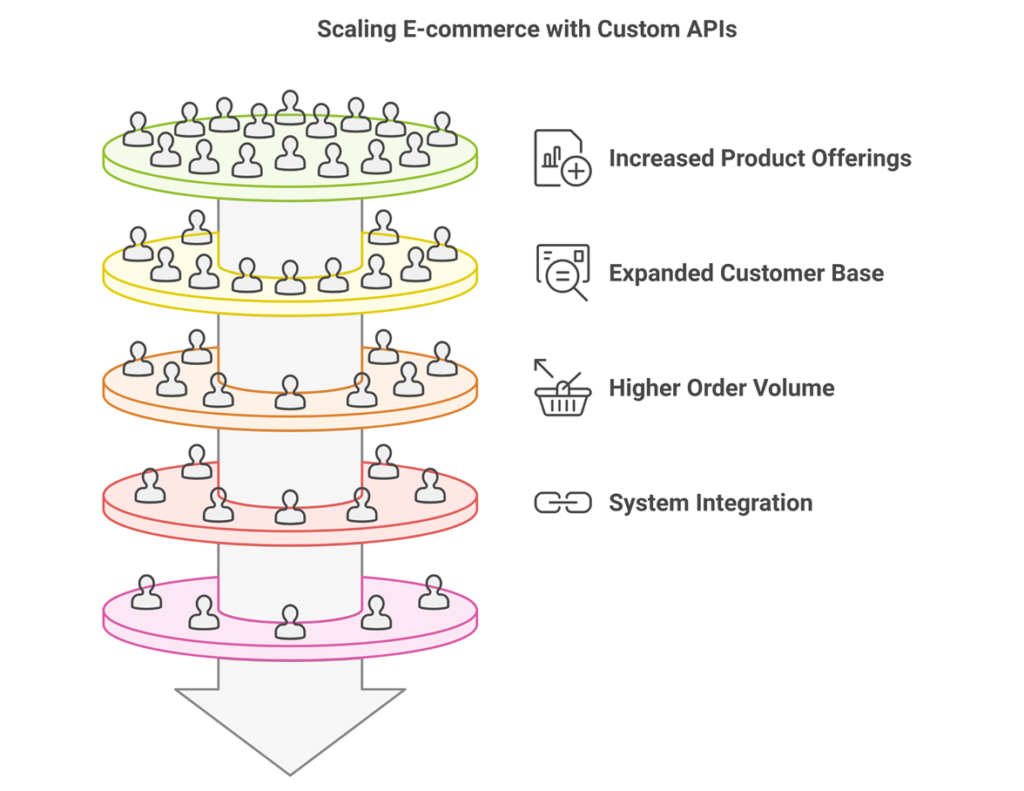
A custom API can support an e-commerce store as it expands its product offerings, grows its customer base, and increases its order volume. This is particularly important because e-commerce platforms are often built on a variety of different systems—such as inventory management, customer support, and shipping software—that need to work together smoothly. Custom APIs make it possible for these systems to interact with one another in real time, ensuring that the business runs efficiently even as it scales.
For example, a custom API can connect the e-commerce platform with inventory management systems to ensure that product availability is automatically updated. As the store adds more products or locations, the custom API can be modified to accommodate these changes without causing disruptions.
Additionally, custom APIs are highly adaptable, meaning they can adjust to the changing needs of the business. For instance, if an e-commerce store experiences a seasonal surge in demand—such as during the holiday season—custom APIs can be optimized to handle higher volumes of orders and traffic. This flexibility helps e-commerce businesses remain agile and responsive, ensuring they can meet customer expectations even during peak periods.
Boosting Operational Efficiency with Custom APIs in E-commerce
E-commerce businesses are constantly looking for ways to improve operational efficiency. One of the most effective ways to achieve this is through automation, which is made possible by custom APIs.
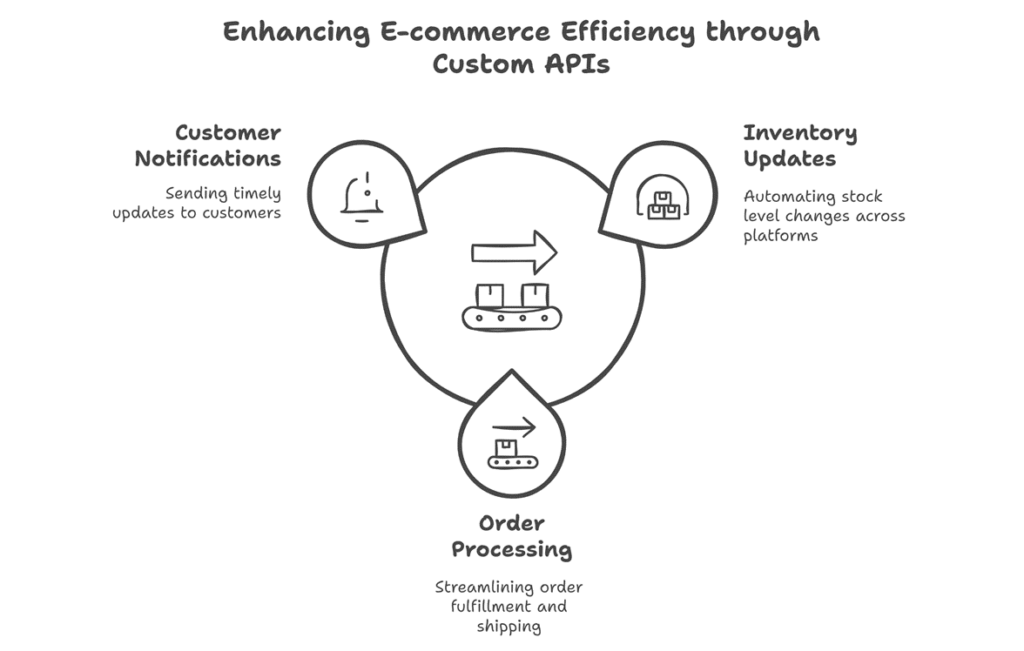
Custom APIs can automate a wide variety of tasks that would otherwise require manual input. For example, inventory updates, order processing, and customer notifications can all be automated with custom API integrations. This not only saves time but also reduces the risk of errors and ensures that operations run smoothly at all times.
Consider the process of managing inventory. Without an API, a business may need to manually update stock levels across multiple platforms—its website, third-party marketplaces, and warehouse systems. This is not only time-consuming but also prone to human error. A custom API can automate this process, ensuring that inventory levels are updated in real time across all platforms without requiring manual intervention.
Similarly, order processing can be automated. When a customer makes a purchase, the custom API can instantly update the warehouse system, process payment, and send a shipping request to the appropriate provider. This streamlining of tasks helps businesses improve their efficiency, reduce operational costs, and deliver a faster, more reliable service to their customers.
Seamlessly Integrating E-commerce Systems with Custom APIs
One of the most significant challenges for e-commerce businesses is ensuring that all their systems work together harmoniously. Whether it’s connecting the e-commerce platform to a CRM system, integrating a new payment gateway, or syncing data with a shipping provider, smooth integration is crucial. Custom APIs excel at solving this problem.
Custom APIs enable e-commerce businesses to integrate their platforms with a wide range of third-party tools and services. For example, a business using Shopify as its e-commerce platform may need to integrate it with a CRM system, a payment gateway like PayPal or Stripe, and a shipping provider like FedEx or UPS. Custom APIs make it possible to connect these systems so that data flows seamlessly between them.
Moreover, APIs ensure that data is exchanged in real time, so inventory, orders, and customer data are always up to date. This is particularly important for businesses that handle large volumes of transactions or have multiple sales channels. With custom APIs, business owners can rest assured that their systems are in sync, enabling them to provide a smooth and efficient customer experience.
Enhancing the Customer Experience with Tailored E-commerce APIs
In the world of e-commerce, providing a personalized and frictionless experience is key to retaining customers and boosting sales. Custom APIs can play a pivotal role in this regard, offering tailored solutions that enhance the customer journey.
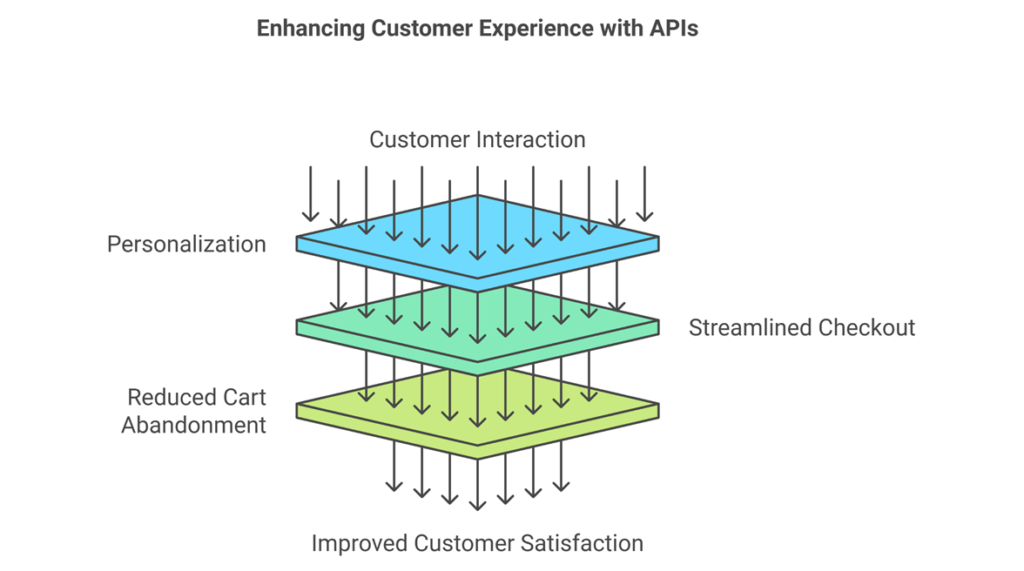
One of the most significant ways in which custom APIs improve the customer experience is through personalization. APIs can integrate with various systems, such as recommendation engines, to offer tailored product suggestions based on customer behavior. This can help businesses create personalized shopping experiences that cater to the individual needs of their customers, increasing the likelihood of conversions and repeat purchases.
Furthermore, the checkout process can be greatly improved with the help of custom APIs. APIs can streamline the checkout process by integrating payment gateways, fraud detection systems, and inventory management tools. This makes the process faster, more secure, and more efficient, reducing cart abandonment rates and improving customer satisfaction.
How Custom APIs Automate and Reduce Costs for E-commerce
For any e-commerce business, cost reduction is a key objective. Custom API development can help achieve this by automating time-consuming tasks and eliminating inefficiencies.
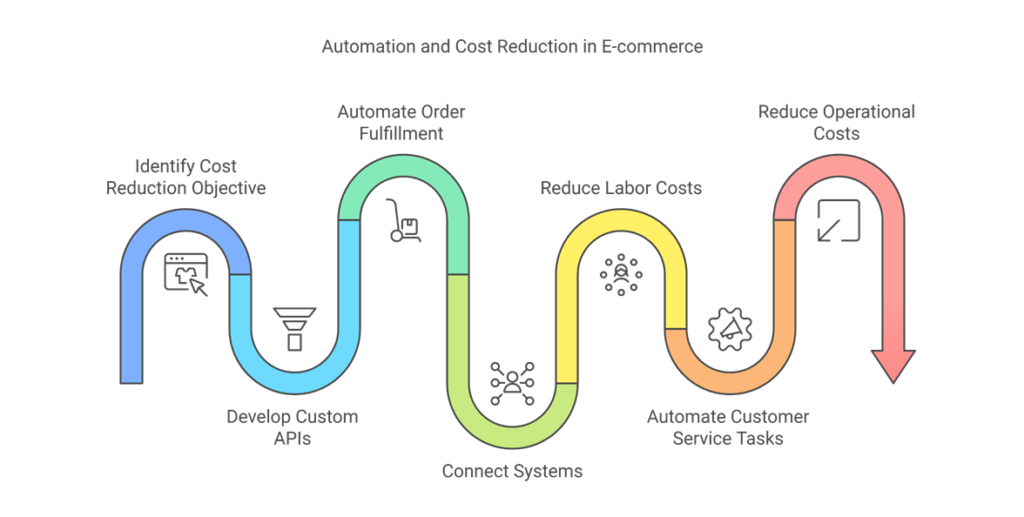
Order fulfillment, for example, can be automated through custom APIs. APIs can connect the e-commerce platform to warehouse management systems, order routing systems, and shipping carriers, ensuring that orders are processed, packed, and shipped with minimal human intervention. This reduces labor costs and the potential for human error, while also speeding up order fulfillment times.
Custom APIs can also reduce costs in other areas, such as customer service. By automating tasks like order status updates, inventory checks, and customer notifications, businesses can reduce the need for customer support staff to answer repetitive questions, thereby lowering operational costs.
Real-World E-commerce Success Stories with Custom APIs
To further illustrate the value of custom API development, let’s look at a few real-world examples of how e-commerce businesses have benefited from integrating custom APIs.
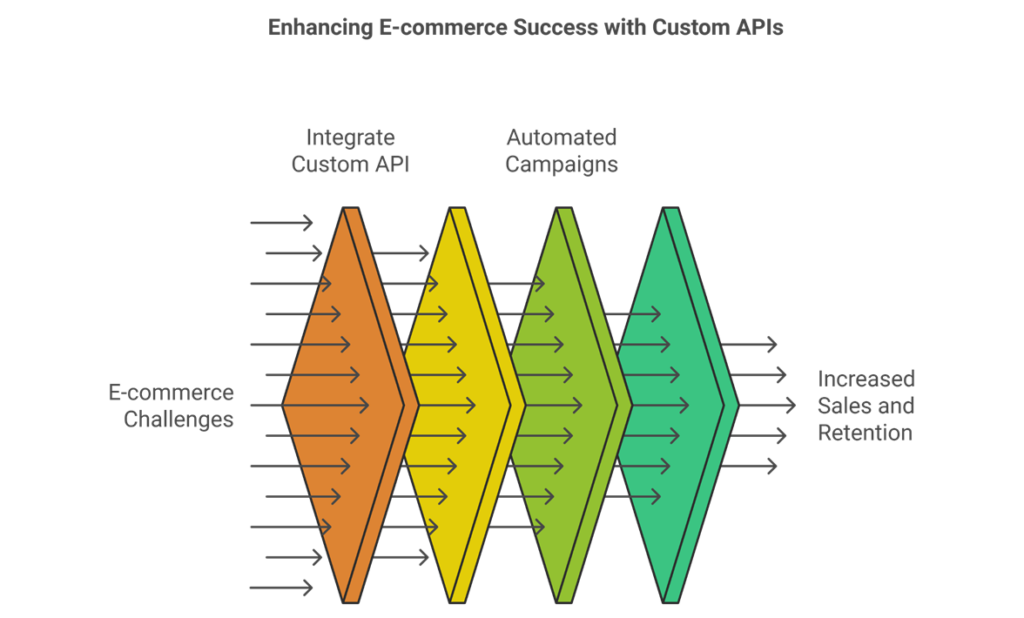
One example is an e-commerce store that was struggling with inventory management across multiple sales channels. By integrating a custom API, the business was able to sync inventory levels in real time, ensuring that customers could see accurate stock availability on the website and third-party platforms. As a result, the store reduced the number of stockouts and oversells, improving customer satisfaction and increasing sales.
Another example is an online retailer that used custom APIs to automate its marketing campaigns. By connecting its e-commerce platform with a customer relationship management (CRM) system and email marketing platform, the business was able to trigger automated email promotions based on customer behavior, such as abandoned cart reminders or personalized product recommendations. This led to a significant increase in conversions and customer retention.
Key Considerations for E-commerce Businesses Before Choosing Custom API Development
Before diving into custom API development, there are several critical factors that e-commerce businesses need to consider to ensure they make informed decisions and avoid costly mistakes. While custom APIs can significantly improve business operations, it’s important to understand the investment, planning, and expertise required for successful implementation.
Budgeting for Development
Developing a custom API is not a small undertaking. The costs involved can vary widely depending on the complexity of the API, the number of systems it needs to integrate with, and the technical expertise required. For instance, a simple API to connect an e-commerce platform to a payment gateway may cost less than an API that needs to handle complex integrations with inventory management, shipping carriers, CRM systems, and analytics tools.
E-commerce businesses need to allocate a budget for not only the initial development but also ongoing maintenance, updates, and scalability. As business needs evolve and new technologies emerge, APIs may require enhancements or modifications to stay relevant. Therefore, it’s essential to consider the long-term costs when budgeting for custom API development.
A successful custom API is one that aligns with the specific needs and goals of the business. Before embarking on API development, business owners must identify the precise functions and features they need from the API. For example, if the primary goal is to improve order processing speed, the API should be designed to optimize communication between the e-commerce platform, warehouse management system, and shipping carriers. Similarly, if the focus is on personalization, the API should integrate seamlessly with recommendation engines and CRM tools.
Clearly defining business objectives is key to creating a custom API that adds value. A comprehensive needs assessment, which takes into account current and future operational challenges, can help businesses determine what kind of API solution will best serve them.
Choosing the right development team is crucial to the success of custom API development. Businesses must work with experienced developers who are proficient in creating secure, scalable, and efficient APIs. Inexperienced developers may create APIs that are prone to errors, security vulnerabilities, or performance issues, which could hinder business operations instead of improving them.
In addition to technical skills, developers should have experience with e-commerce platforms and systems that the business uses. For example, a developer with experience in Shopify API integrations may be more suited to build custom solutions for a Shopify store than someone with limited knowledge of the platform.
The Development Process for E-commerce APIs: What to Expect
Custom API development for e-commerce businesses is a multi-step process that involves careful planning, technical design, coding, testing, and deployment. Each stage is critical to ensuring that the API functions as expected and meets the needs of the business.
The first step in the API development process is planning and requirements gathering. During this phase, businesses need to identify what they want the API to achieve, which systems need to be integrated, and the specific features required. This stage often involves collaboration between the business team, developers, and other stakeholders to define the project scope and functionality.
Next comes the design phase, where developers will create the architecture of the API. This includes designing how the different systems will communicate, determining data flow, and ensuring that the API can scale as the business grows. Security is also a key consideration at this stage, especially when dealing with sensitive customer data such as payment information.
After the design is approved, the development team moves on to the coding phase. This is where the actual API is built, incorporating all the necessary features and functionality. Developers will need to ensure that the API works seamlessly with the e-commerce platform and any third-party services that the business relies on.
Once the API is built, it goes through a series of testing phases. This includes unit testing, integration testing, and performance testing to ensure that the API works as expected under real-world conditions. Testing is crucial to identify any bugs or issues that could cause disruptions in the business operations.
Finally, the deployment phase involves launching the API in a live environment. During this phase, the API is integrated with the e-commerce platform and other systems, and the business can start reaping the benefits of improved automation, data flow, and integration.
The timeline for developing a custom API for e-commerce can vary depending on the complexity of the project. A simple API integration may take a few weeks to a month, while a more complex solution could take several months to complete. It’s important to set realistic expectations and account for time spent on each stage of the development process, including testing and potential iterations.
Custom APIs as a Driver of Innovation in E-commerce
Custom APIs are not only beneficial for improving existing business operations—they can also be a powerful tool for driving innovation and opening up new opportunities.
One of the most exciting aspects of custom APIs is their ability to unlock new revenue streams. For example, e-commerce businesses can use APIs to forge strategic partnerships with other companies or integrate new features that provide additional value to customers. Custom APIs can allow businesses to offer innovative services, such as integrating loyalty programs, enabling affiliate marketing, or creating new ways for customers to interact with the brand.
For instance, an e-commerce business could partner with a third-party provider to offer subscription-based services or create a custom API that allows customers to personalize their shopping experience in unique ways. By integrating with external services, businesses can create entirely new revenue channels that were not possible before.
Custom APIs provide a foundation for continuous improvement and growth. As business needs evolve and customer expectations change, APIs can be modified and expanded to accommodate new features or integrations. This adaptability ensures that businesses can stay ahead of the curve and remain competitive in a rapidly changing e-commerce landscape.
Moreover, custom APIs enable businesses to test and implement new ideas more quickly. For example, a company could test a new product recommendation algorithm or integrate an AI-powered chat system into its website without having to overhaul its entire platform. The flexibility of custom APIs allows businesses to innovate without major disruptions to their operations.
Overcoming Common Challenges in Custom API Development for E-commerce
While custom API development offers many benefits, it also comes with its own set of challenges. Businesses need to be aware of these obstacles and plan accordingly to overcome them.
One of the most common challenges businesses face during custom API development is integrating the new API with existing systems. Many e-commerce businesses use a mix of legacy software, third-party services, and new technologies, which can sometimes be difficult to integrate. Developers need to ensure that the custom API can work seamlessly with all these different systems, which may require additional time and resources.
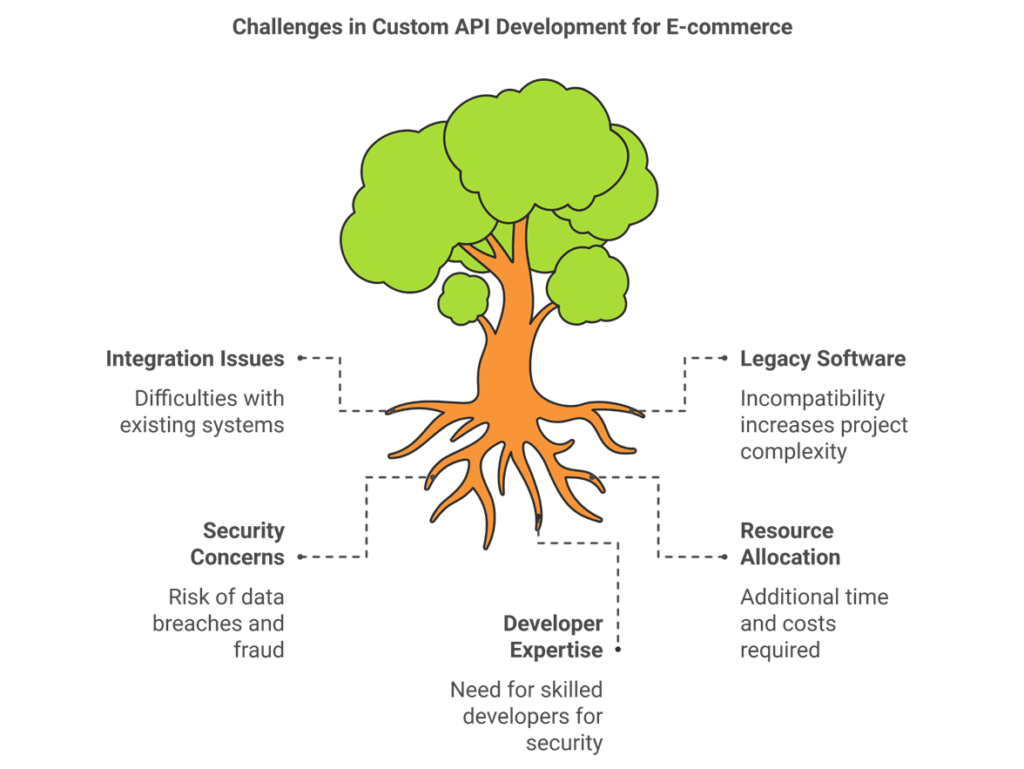
In some cases, businesses may need to invest in upgrading or replacing older systems that are incompatible with the new API. This can add to the overall cost and complexity of the project.
Security is always a top priority when it comes to APIs, especially in e-commerce, where businesses handle sensitive customer data such as credit card information and personal details. Custom APIs must be built with robust security measures to prevent data breaches, fraud, and unauthorized access. Businesses should work with experienced developers who follow best practices for API security, including encryption, authentication, and regular security audits.
The Future of E-commerce and Custom API Development
Looking to the future, custom API development will continue to be a driving force in the growth and evolution of e-commerce. As technology advances and consumer expectations shift, APIs will play an even more critical role in enabling businesses to scale, adapt, and provide personalized experiences.
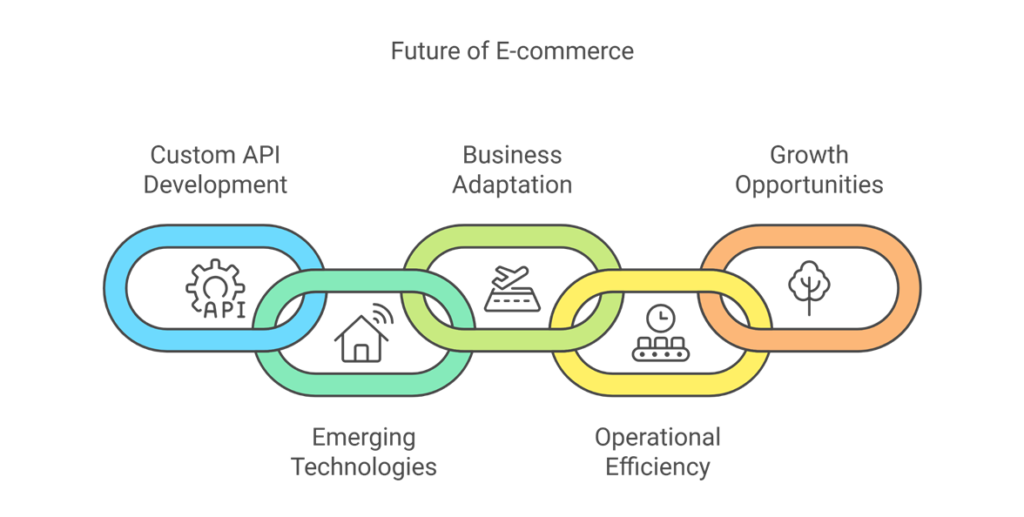
Custom APIs will become increasingly important as businesses seek to integrate emerging technologies, such as artificial intelligence, machine learning, and Internet of Things (IoT) devices, into their e-commerce operations. These technologies will require highly specialized, flexible APIs to function properly, and businesses that leverage custom APIs will be well-positioned to stay ahead of the competition.
By embracing custom API development, e-commerce businesses can not only improve their operational efficiency and customer experience but also unlock new opportunities for growth and innovation. The possibilities are limitless, and the businesses that invest in custom APIs today will be the leaders of tomorrow.
Final Thoughts: Embracing the Future of E-commerce with Custom API Development
In conclusion, custom API development is not just a technical necessity but a powerful enabler for e-commerce businesses aiming to thrive in an increasingly competitive and fast-paced market. The ability to create tailored integrations that perfectly fit a business’s needs—whether it’s for scalability, operational efficiency, or enhancing the customer experience—gives e-commerce businesses the agility they need to succeed.
While off-the-shelf APIs offer a quick and cost-effective solution, they often lack the flexibility and customization required to address the unique challenges faced by growing e-commerce platforms. Custom APIs, on the other hand, provide businesses with the ability to create sophisticated, scalable, and secure solutions that can evolve as the business grows.
From automating processes and streamlining operations to providing personalized customer experiences and driving innovation, the potential benefits of custom API development are vast. Whether you’re a small business just starting or an established player looking to optimize your operations, integrating custom APIs will give you the tools needed to scale efficiently, reduce costs, and stay ahead of the competition.
As the e-commerce industry continues to grow, embracing custom APIs will not only improve current business operations but also open up new opportunities for future expansion. By investing in custom API development, you’re not just upgrading your technology—you’re investing in the long-term success and sustainability of your e-commerce business.
At Koigel, we understand the complexities of API integration and can help guide your business through the process, ensuring that your custom API solutions are perfectly aligned with your unique needs. By working with experienced developers, businesses can unlock the true potential of their platforms, empowering them to scale faster, offer better services, and ultimately provide a seamless, personalized experience for their customers.

